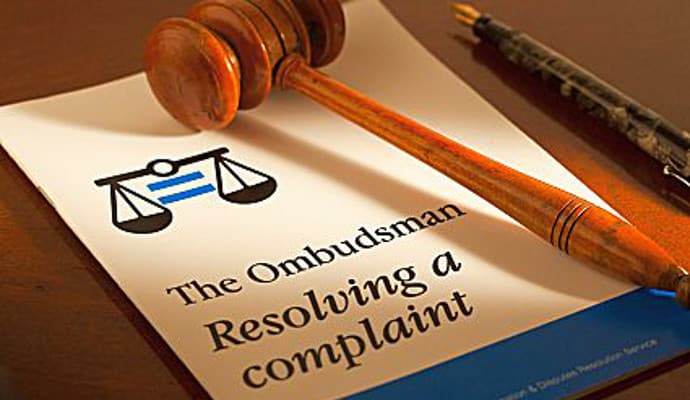 Guest Blogger: Christopher Stieben
Guest Blogger: Christopher Stieben
Chris Stieben has worked at ABLE for 9 years, gaining experience as a Certified Ombudsman Specialist and Certified Program Director. As a seasoned Ombudsman, he is passionate about advancing advocacy and information for elders across the ageing network.
Before joining ABLE Chris worked at ProMedica as a Financial Advocate for almost 10 years. Chris attended The University of Toledo and Spring Arbor University. In addition to his responsibilities at ABLE, he is current Chairman of TRIAD and is active with the Coalition of Organizations Protecting Elders (COPE).
Outside of the office, Chris enjoys coaching and playing basketball, singing, and entertaining his 15 grandchildren.
What is an Ombudsman?
Ombudsman:The word is hard to say, its meaning is equally difficult to explain.
The Older Americans Act of 1965 created the Ombudsman position for Long-term care (LTC) consumers (nursing homes, assisted living, hospice, group homes, and home care).
In Ohio there is a State Ombudsman located at the Department of Aging in Columbus. The State Ombudsman oversees 12 regional programs that provide local services with timely access to in-person advocates. Acting ombudsman locally serve the community following certification by the State Ombudsman with two levels of certification including Certified Ombudsman Specialist and Certified Ombudsman Associate.
The implementation of an Ombudsman program within LTC provides the pathway to ensure that all LTC consumers have an advocate to ensure access to quality care and services.
Ombudsman educate consumers on their rights, empowering individuals to advocate for themselves as informed consumers. In addition, Ombudsman make regular visits to homes to make observation of overall systems and meet with residents to get their input on quality of care. Further, if individual consumer advocacy breaks down, Ombudsman work to investigate and resolve complaints on behalf of consumers.
The paradigm of elder care must change if we are going to provide the quality that we say we provide to our elders. Regulations are not enough to insure quality care. It takes consumers and families demanding the excellence in order to hold providers accountable to the services they provide.
It will take a community of leaders identifying poor performing facilities and inserting themselves in to the culture of a home to elevate it to a level of quality that deserves our business.
Moving forward, it is necessary to promote a mindset in LTC that recognizes our elders as royalty and integral members of society. A society which has been created and maintained by the elders in our communities. Keep the conversation going, thank an elder in your life, and become engaged with the LTC community to demand excellence in care. For those of us lucky enough to live a full life, aging is a universal experience, and advocating for quality in care will prove beneficial to current and future generations.
The Ombudsman Program in Northwest Ohio is housed at ABLE LAWO in downtown Toledo. Advocates for Basic Legal Equality, Inc. (ABLE) is a non-profit regional law firm that provides high quality legal assistance in civil matters to help eligible low-income individuals and groups in western Ohio achieve self-reliance, and equal justice and economic opportunity. This partnership broadens the advocacy that the Ombudsman program can provide to all consumers.
You have access to the Ombudsman by contacting our office we also have opportunities available to be a certified Ombudsman associate and volunteer to visit Elders and advocate for them, together we can change this paradigm.
For more information, or if you are interested in volunteering for this program, please visit the Get Involved: Ombudsman Volunteers section on this site and contact the Long-Term Care Ombudsman Program Volunteer Coordinator:
Phone: (419) 259-2891 or (800) 542-1874
E-mail: volunteers@ablelaw.orgWe also invite you to visit the full Long-Term Care Ombudsman website:
ombudsman.ablelaw.org
About ABLE Services
Using both litigation and advocacy, ABLE handles civil (non-criminal) legal matters that promote systemic change on behalf of individuals and groups of low-income people in the areas of civil rights and poverty law. Much of our work seeks to change policy, laws, and regulations at local and state levels.
ABLE programs and advocates provide specialized legal assistance, including representation on behalf of those who are discriminated against, advocacy for the disabled, advocacy for nursing home and long-term care facility residents, litigation in public policy cases, and outreach and education to low-income people and community organizations serving the poor or areas that coincide with the law firms legal priorities.
ABLE serves 32 counties of western Ohio from its offices in Dayton, Defiance, and Toledo. Attorneys and advocate staff work with legal problems that affect large groups of low-income people. Successful case outcomes bring about permanent changes in services, systems and institutions that ultimately benefit hundreds or even thousands of individuals and families.
For additional information, visit www.ablelaw.org/able-services.

 Arista Wins Top Workplaces Award
Arista Wins Top Workplaces Award


